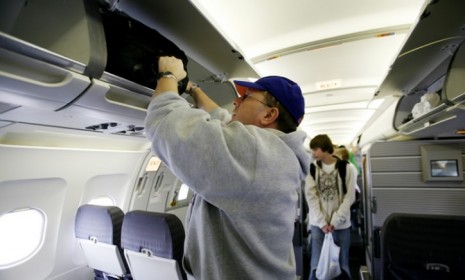Should airlines charge a fee for oversized carry-ons?
The battle for overhead bins gets more intense with every flight, but passengers may not take kindly to yet another extra charge

A free daily email with the biggest news stories of the day – and the best features from TheWeek.com
You are now subscribed
Your newsletter sign-up was successful
Everyone knows that sinking feeling of boarding a flight to find that all the overhead bins are bursting with huge bags, many of which are suspiciously larger than regulation size. And then there is the bottleneck at the gate-check, where airline agents identify oversized bags and then drag them into the belly of the plane. Well, it appears that airlines are finally preparing to do something about oversized carry-ons. "Some domestic airlines are weighing the idea of discouraging passengers from lugging oversize carry-on bags onto planes by imposing a $25 charge," says Joe Sharkey at The New York Times. But big airlines are reportedly reluctant to talk much about it, fearing a backlash from passengers. Here, a guide to the latest possible fee from the airline industry:
Why are oversized carry-ons such a problem?
Since airlines began charging for checked bags, in 2008, "airline cabins have been inundated with bags of all sizes," as "cost-conscious customers have attempted to skirt such fees by eschewing checked bags for carry-ons," says Ben Mutzabaugh at USA Today. The fee for check-ins has created a "chaotic scene at boarding gates across the country."
The Week
Escape your echo chamber. Get the facts behind the news, plus analysis from multiple perspectives.

Sign up for The Week's Free Newsletters
From our morning news briefing to a weekly Good News Newsletter, get the best of The Week delivered directly to your inbox.
From our morning news briefing to a weekly Good News Newsletter, get the best of The Week delivered directly to your inbox.
But don't passengers hate using overhead bins?
Yes. "Seldom do passengers, gate agents, flight attendants, and airline management all agree on anything — but all agree that the current system is awful," says Sharkey. Along with airline security, the "glum ritual" of searching for "space in a crammed overhead bin is one of the two high-anxiety choke points in air travel."
How are airlines combating the problem?
Budget airlines like Spirit have taken things to an extreme, charging passengers $45 "for carry-on bags that won't fit under the seat," says Giselle Smith at MSN Money. And Spirit has announced that it will soon up the fee to $100. Meanwhile, Alaska Airlines charges passengers $25 if they show up at the gate with a bag bigger than the regulation size (10 by 17 by 24 inches). That's higher than the airline's check-in fee, "so you might as well check all the other stuff you're shlepping," says Linda Thomas at TheNewsChick.
A free daily email with the biggest news stories of the day – and the best features from TheWeek.com
And bigger airlines are also considering a fee?
Yes. They all recognize that "bags the size of Winnebagos and the people who break the rules by hauling them on board are a continuing nuisance," says Sharkey. Airlines are also considering taking the Spirit route of discouraging all overhead carry-ons, even though "the consumer uproar would be thundering."
How would passengers react to a fee for oversized bags?
Some would welcome airlines finally doing something to reduce "overcrowded overhead compartments and delays at boarding," says Smith. On the other hand, says Thomas, a new fee could become the latest irritant for passengers who can't seem to escape the airlines' constant refrain: "That'll cost you."
Sources: MSN Money, The New York Times, TheNewsChick, USA Today, Washington Post
-
 Bondi, Democrats clash over Epstein in hearing
Bondi, Democrats clash over Epstein in hearingSpeed Read Attorney General Pam Bondi ignored survivors of convicted sex offender Jeffrey Epstein and demanded that Democrats apologize to Trump
-
 Are Big Tech firms the new tobacco companies?
Are Big Tech firms the new tobacco companies?Today’s Big Question Trial will determine if Meta, YouTube designed addictive products
-
 El Paso airspace closure tied to FAA-Pentagon standoff
El Paso airspace closure tied to FAA-Pentagon standoffSpeed Read The closure in the Texas border city stemmed from disagreements between the Federal Aviation Administration and Pentagon officials over drone-related tests